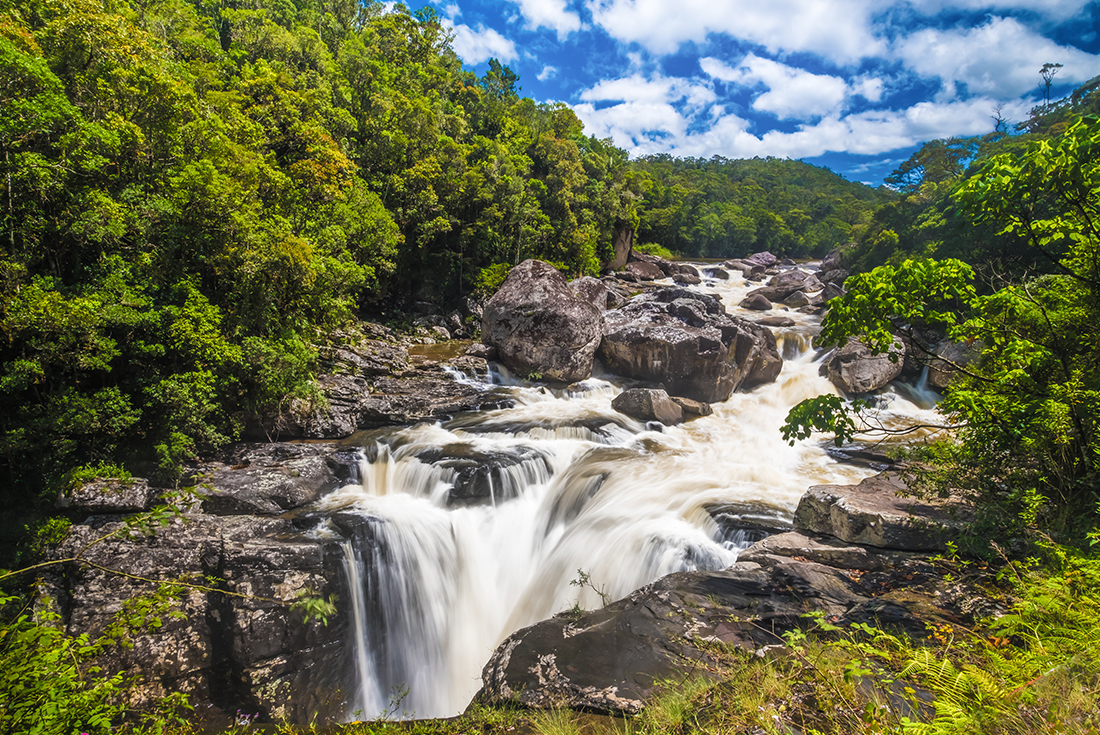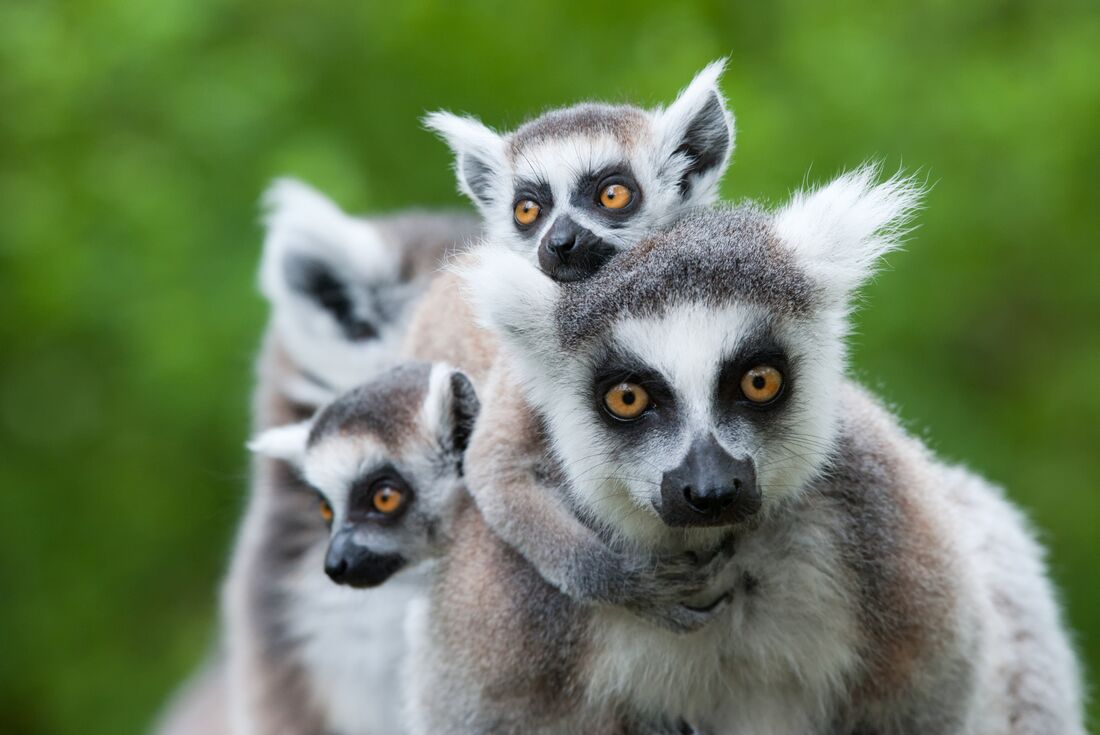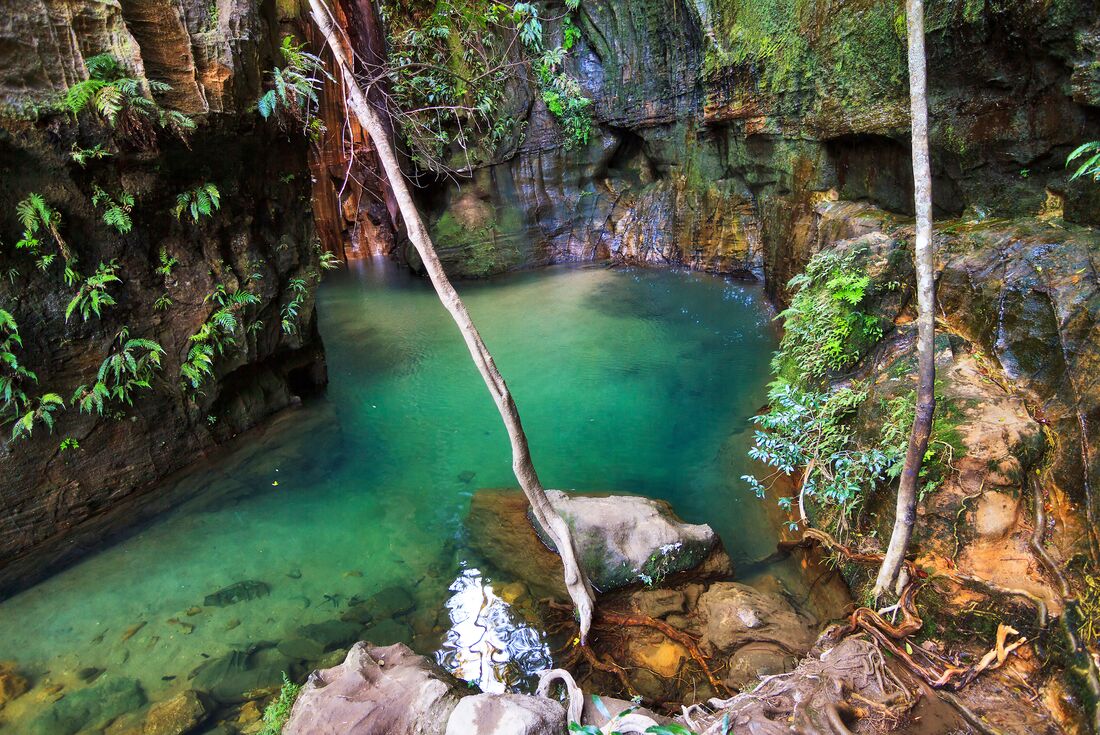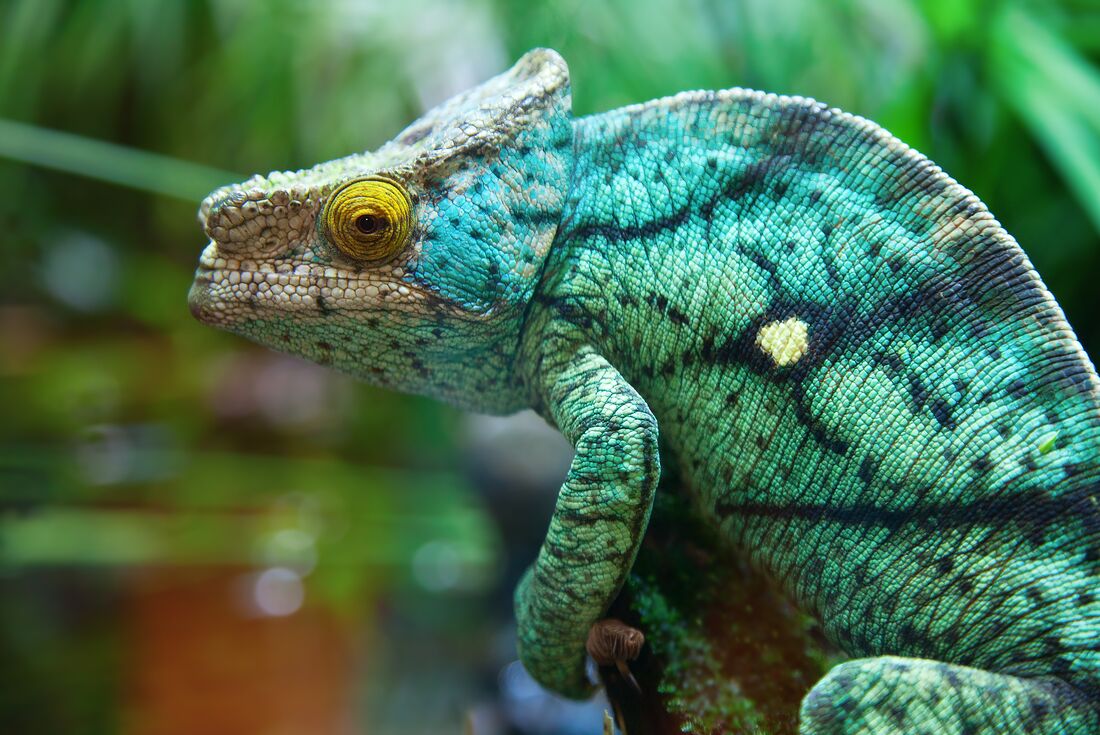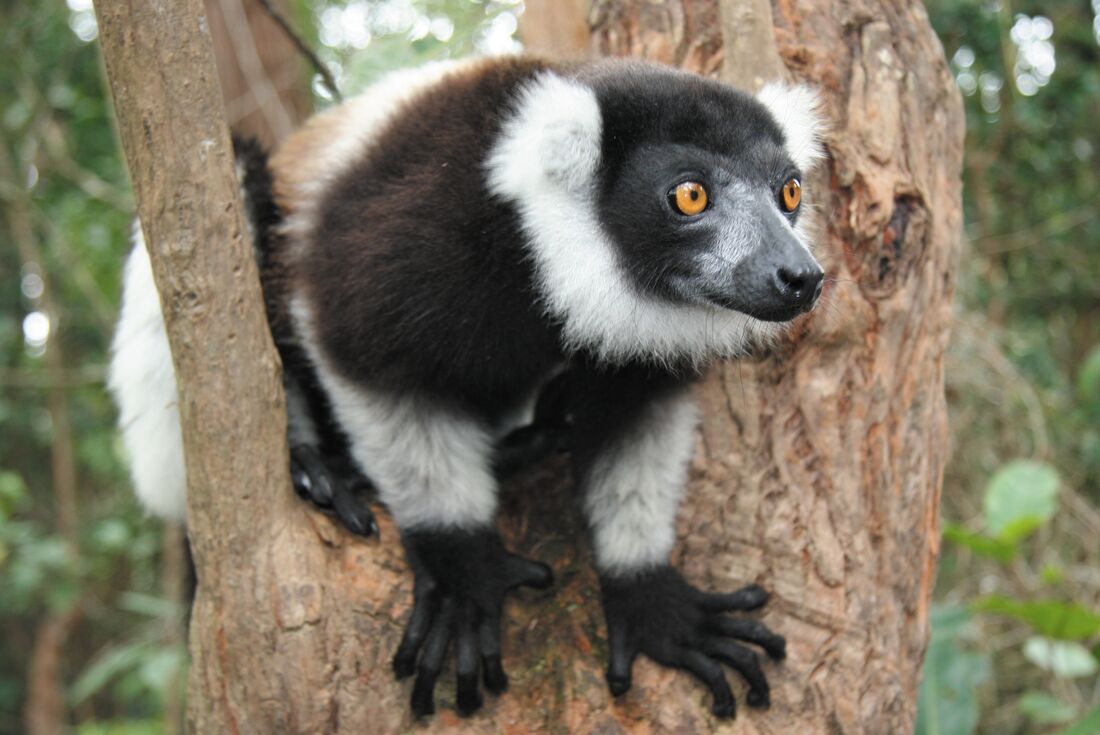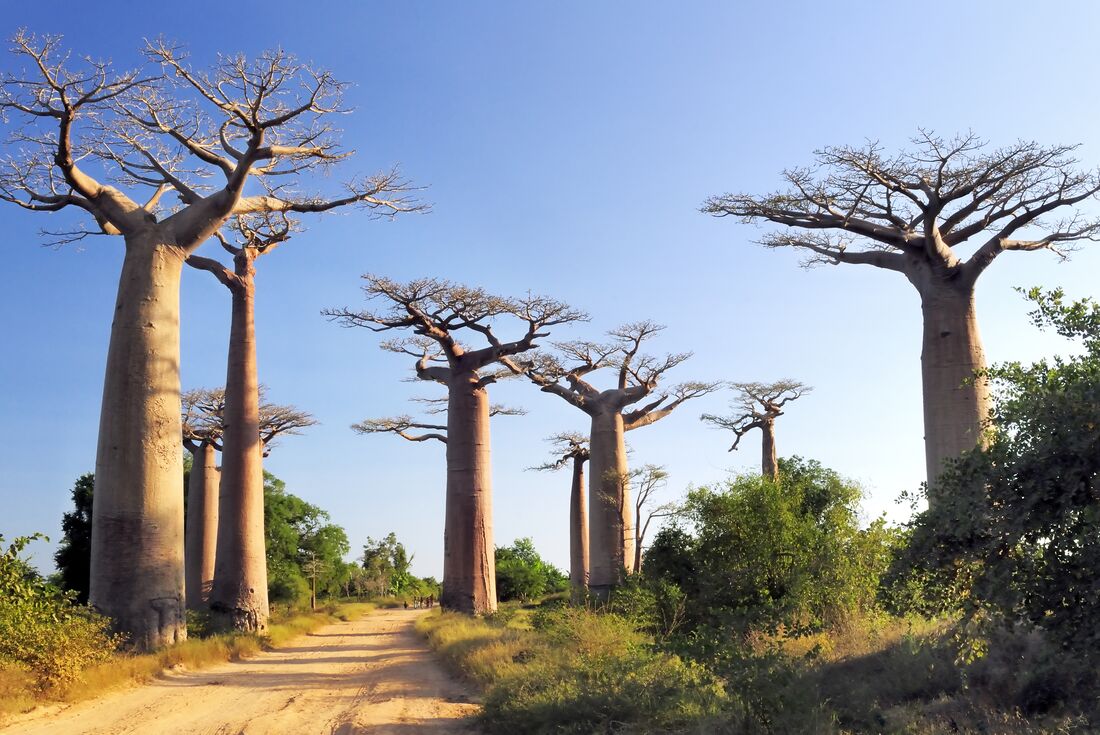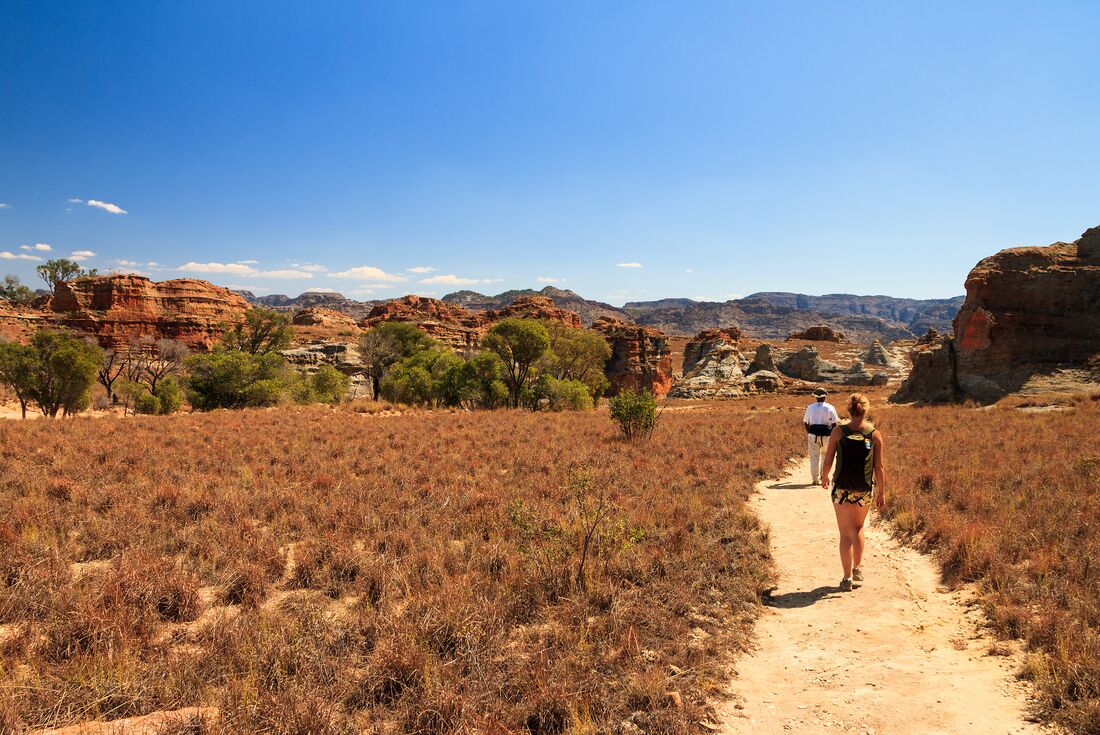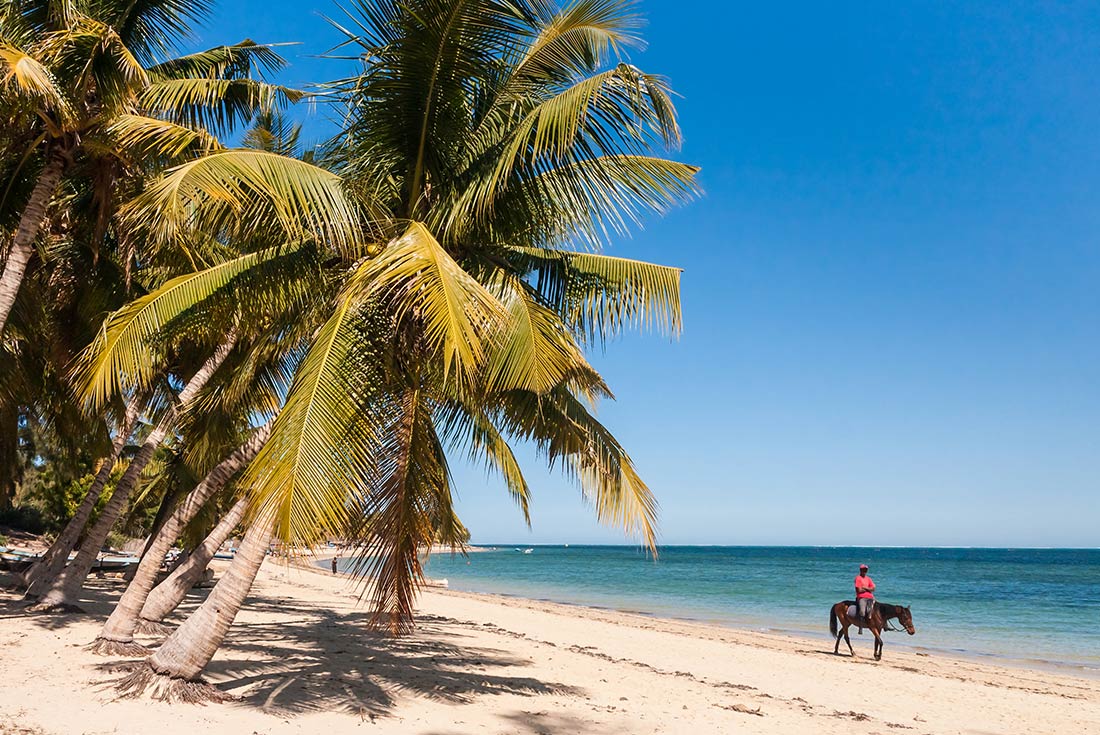- A wildlife lover's dream – count how many species of lemur and other exotic animals you can spot as you explore the Anja Community Reserve, Ranomafana National Park and Andasibe National Park.
- Connect with nature during a stay in a cottage deep within the Ranomafana National Park, surrounded by lush rainforest and countless species of fascinating plants and animals.
- Learn more about the important Malagasy process of silk production with a visit to local village industries in Manandriana where a cooperative of silk weavers are using their craft both to preserve local tradition and to provide for the future.
- Explore Mitsinjo Forest – a privately-owned reserve that’s giving back to the local community and promoting conservation – on a guided night walk where you’ll be lucky to catch glimpse of nocturnal species likes endemic butterflies and lemurs.
- Take a hands-on chocolate making class with a local chef and learn the secrets that make Malagasy chocolate so unique and delicious – and then get to sample your creations!
07 Feb 2024
Madagascar Adventure
YBSN
Validity: 01 Jan 2024 to 31 Dec 2024
Create your own wildlife-filled jungle jaunt through Madagascar on this 14-day adventure to the island’s hotspots. You’ll be lazing on white-sand beaches, exploring tropical rainforests and spending time with a huge variety of local wildlife, including the lemur – the island's most popular animal inhabitants. Dig a little deeper throughout your journey and interact with local communities, getting an insight into the day-to-day life of Malagasy and Betsileo peoples. Discover the French colonial influences in Antananarivo and Antsirabe, and get the chance to chill out in your own time. An eco escapade in Madagascar awaits, with local wildlife, beaches and a little adventure at every turn.
Original
Wildlife
Private Vehicles,Boat,Plane
3
Hotel Belvedere
Lot IF 27 bis Isoraka
Antananarivo
101
MADAGASCAR
Phone: +261 347986638
Belvedere Hotel is centrally located in Antananarivo, perched on a hill with views of the city, and within walking distance to shops, restaurants and banks. Rooms are equipped with private ensuite, air-conditioning, TV, phone & mini-fridge. Hotel facilities include restaurant, bar, and WiFi access.
If you have pre-booked a transfer, your driver will be waiting for you outside the arrivals hall. Please look for our driver who will be holding a card with your name on it. They will be waiting outside the arrival building. The driver will wait for an hour after your scheduled arrival time. If you are unable to find your driver you can call our local operator on +261 34 14 660 05 or +261 34 14 660 06. If you are delayed beyond one hour after your scheduled arrival time, please make your own way to the hotel. Taxis are also available. The cost to the hotel will be approximately AR 80,000 which is payable to the driver. The taxi rank is located just outside the arrivals area.
Hotel Belvedere
Lot IF 27 bis Isoraka
Antananarivo
101
MADAGASCAR
Phone: +261 347986638
Belvedere Hotel is centrally located in Antananarivo, perched on a hill with views of the city, and within walking distance to shops, restaurants and banks. Rooms are equipped with private ensuite, air-conditioning, TV, phone & mini-fridge. Hotel facilities include restaurant, bar, and WiFi access.
1. A single supplement is available if you’d prefer not to share a room on this trip. The single supplement applies to all nights on your trip and is subject to availability. Please speak to your booking agent for further information. 2. There is an internal flight included on this trip. Baggage allowance is as follows:Checked-in: 1 Bag, max 20kg Cabin Luggage: 1 bag, max 5kg. Internal flights in Madagascar are often delayed and or cancelled at short notice, for this reason, we have included an additional day in Antananarivo to safeguard against possible changes to flights. For this reason, we do recommend booking any international departures until departure day. 3. A copy of your passport is required at least one month prior to departure so flights can be booked.
All group trips are accompanied by one of our group leader or local representative. The aim of the group leader or local representative is to take the hassle out of your travels and to help you have the best trip possible. Intrepid endeavours to provide the services of an experienced group leader or local representative however, due to the seasonality of travel, rare situations may arise where your group leader or local representative is new to a particular region or training other group leader or local representative. Your group leader or local representative will provide information on the places you are travelling through, offer suggestions for things to do and see, recommend great local eating venues and introduce you to our local friends. While not being guides in the traditional sense, you can expect them to have a broad general knowledge of the places visited on the trip, including historical, cultural, religious, and social aspects. At Intrepid we aim to support local guides who have specialised knowledge of the regions we visit. If you are interested in delving deeper into the local culture at a specific site or location then your group leader or local representative can recommend a local guide service in most of the main destinations of your trip. On this trip for small groups of 1-3 travellers your leader will also be your driver. For sustainability and a lower carbon footprint, we will also use a 4x4 SUV or similar, rather than a van or coach.
Most national governments provide regularly updated foreign travel advice on safety issues involved with international travel. We recommend that you check your government's advice for their latest travel information before departure and ensure that your travel insurance covers you for all destinations and activities on your trip. Please refer to our website's safety page for links to major travel advisories and updates on safety issues affecting our trips here: https://www.intrepidtravel.com/travel-alerts We strongly recommend the use of a neck wallet or money belt while travelling, for the safe-keeping of your passport, flight tickets, cash and other valuable items. Leave your jewellery at home - you won't need it while travelling. Many of our hotels have safety deposit boxes, which is the most secure way of storing your valuables. A lock is recommended for securing your luggage. Your group leader or local representative will accompany you on all included activities, however, during your trip you'll have some free time to pursue your own interests or relax and take it easy. While your group leader or local representative will assist you with the available options in a given location, please note that any optional activities you undertake are not part of your Intrepid itinerary, and Intrepid makes no representations about the safety of the activity or the standard of the operators running them. Please use your own good judgement when selecting an activity in your free time. Please also note that your group leader or local representative has the authority to amend or cancel any part of the trip itinerary if it's deemed necessary due to safety concerns. Intrepid's operational safety policies can be viewed on our website at the link below. We recommend that you take a moment to read through this information before travelling, and would appreciate any feedback on how safety is being managed on our trips.
https://www.intrepidtravel.com/safety-guidelines
PETTY THEFT AND PERSONAL SAFETY While travelling there is always the risk of pick-pocketing and petty theft, particularly in the more touristy cities. We recommend that you exercise caution when walking alone at night and encourage you to walk together and only on main, well-lit thoroughfares. Be particularly vigilant on public transport. Simple measures like carrying your day pack on your front, not hanging your bag over the back of your chair or on the floor and wearing a money belt will reduce any chance that your valuables should go missing.
Many national governments provide a regularly updated advice service on safety issues involved with international travel. We recommend that you check your government's advice for their latest travel information before departure and ensure that your travel insurance covers you for all areas your itinerary covers. Please refer to our website's safety page for links to major travel advisories and updates on safety issues affecting our trip. We strongly recommend the use of a neck wallet or money belt while travelling, for the safe-keeping of your passport, air tickets, cash and other valuable items. Leave your valuable jewellery at home - you won't need it while travelling. Many of our hotels have safety deposit boxes, which is the most secure way of storing your valuables. A lock is recommended for securing your luggage. Your group leader or local representative will accompany you on all included activities, however during your trip you'll have some free time to pursue your own interests, relax and take it easy or explore at your leisure. While your group leader or local representative will assist you with the available options in a given location, please note that any optional activities you undertake are not part of your Intrepid itinerary, and Intrepid makes no representations about the safety of the activity or the standard of the operators running them. Please use your own good judgement when selecting an activity in your free time. Please also note that your group leader or local representative has the authority to amend or cancel any part of the trip itinerary if it's deemed necessary due to safety concerns. For more details on the type of conditions and safety standards you can expect on your trip, please refer to Intrepid's operational safety policy on our website. We recommend that you take a moment to read through this information before travelling, and would appreciate any feedback on how well it's being implemented in the field: www.intrepidtravel.com/safety-guidelines
FIRE PRECAUTIONS Please be aware that local laws governing tourism facilities in this region differ from those in your home country and not all the accommodation which we use has a fire exit, fire extinguishers or smoke alarms. BALCONIES Some hotel balconies don't meet western standards in terms of the width of the balcony fence being narrower than 10cm. TRAFFIC AND DRIVING ON THE OTHER SIDE OF THE ROAD Depending on where you come from please note that drivers in this part of the world may drive on the opposite side of the road from what you are used to. Look both ways before crossing any road. Traffic can be a little more chaotic than you might be used to at home. Be aware! SEAT BELTS Please be aware that local laws governing transportation safety may differ from those in your home country and not all the transport which we use is able to provide seat belts. PICK POCKETING & PERSONAL SAFETY While travelling there is always the risk of pick-pocketing and petty theft, particularly in the more touristy cities. We recommend that you exercise caution when walking at night and encourage you to walk in groups and only on main, well-lit thoroughfares. Be particularly vigilant on public transport. Simple measures like carrying your day pack on your front, not hanging your bag over the back of your chair or on the floor and wearing a money belt will reduce any chance that your valuables should go missing. WATER SAFETY Please take care when taking part in any activities in the ocean, river or open water, where waves and currents can be unpredictable. It's expected that anyone taking part in water activities is able to swim and have experience in open water. All swimmers should seek local advice before entering the water. TRAVEL ADVICE & TRAVEL INSURANCE We recommend that you check your government's advice in relation to the areas you will be visiting for their latest travel information before departure and ensure that your travel insurance covers you for all areas your itinerary covers.
PASSPORT You’ll need a valid passport to travel internationally and most countries require your passport to have a minimum of 6 months validity, so remember to check the expiry date. We need your passport information to get everything ready for your trip so it’s important that the information on your booking matches your passport exactly. Please take care to provide the correct details. We recommend carrying a copy of the photo page of your passport while travelling and leaving a copy at home with family or friends. VISAS & ENTRY REQUIREMENTS Many countries require a visa and obtaining the correct visa for your trip and any countries you may transit through is your responsibility. We recommend you check your visa requirements as soon as you have booked your trip. This will ensure you have time to prepare your documents and for your visa application to be processed. You can check the entry requirements for your nationality on your government's foreign travel advisories, consular websites or on our page here: www.intrepidtravel.com/visa-entry-requirements
A wildlife lover's dream – count how many species of lemur and other exotic animals you can spot as you explore the Anja Community Reserve, Ranomafana National Park and Andasibe National Park.
Connect with nature during a stay in a cottage deep within the Ranomafana National Park, surrounded by lush rainforest and countless species of fascinating plants and animals.
Learn more about the important Malagasy process of silk production with a visit to local village industries in Manandriana where a cooperative of silk weavers are using their craft both to preserve local tradition and to provide for the future.
Explore Mitsinjo Forest – a privately-owned reserve that’s giving back to the local community and promoting conservation – on a guided night walk where you’ll be lucky to catch glimpse of nocturnal species likes endemic butterflies and lemurs.
Take a hands-on chocolate making class with a local chef and learn the secrets that make Malagasy chocolate so unique and delicious – and then get to sample your creations!
Although anyone with a good level of fitness should be able to partake in this itinerary, there are several challenging aspects: guided day walks through the many national parks can be hot and humid. Please ensure you bring sturdy walking shoes and comfortable clothes. Road conditions in Madagascar are also notoriously poor. This means some of the driving days will be long as well as bumpy. Sometimes you’ve got to rough it to get amongst it. Some accommodation inside the national parks is basic and may not have the creature comforts of hotels in bigger towns and cities. Be prepared for no wi-fi or air conditioning. But also for charming, tucked away locations you won’t quite believe are real.
GENERAL HEALTH All travellers need to be in good physical health in order to participate fully on this trip. For the safety and wellbeing of yourself and others, if you are unwell prior to travelling, please stay at home and contact us to make alternative arrangements. When selecting your trip please make sure you have read through the itinerary carefully and assess your ability to manage and enjoy our style of travel. Please note that if in the assessment of our group leader or local representative a traveller is unable to complete the itinerary without undue risk to themselves and/or the rest of the group, we reserve the right to exclude them from all or part of a trip without refund. You should consult your doctor for up-to-date medical travel information or for any necessary vaccinations before departure. We recommend that you carry a first aid kit as well as any personal medical requirements in their original packaging as they may not easily be obtained while travelling. If you are carrying medication, ensure you check your government's foreign travel advice for any local restrictions or requirements. YELLOW FEVER: A valid international certificate of vaccination against Yellow Fever is required in many countries if you are arriving from a country with risk of yellow fever (eg. Kenya). You may need to present this on arrival at the airport or border crossing. Some countries will refuse entry if you are unable to present your certificate. It's also quite common for your home country to request a Yellow Fever certificate on your arrival back home. It is your responsibility to check with your doctor well in advance of leaving home about the Yellow Fever requirements for the countries you'll be visiting. DRINKING WATER As a rule, we recommend you don't drink tap water, even in hotels, as it may contain much higher levels of different minerals than the water you are used to at home. For local people, this is not a problem as their bodies are used to this and can cope, but for visitors drinking the tap water can result in illness. Generally, this isn't serious, an upset stomach being the only symptom, but it's enough to spoil a day or two of your holiday. Many hotels and lodges provide safe drinking water, while bottled water is another alternative. Water consumption should be about two litres a day. Rehydration salts, motion sickness tablets, and diarrhea blockers are available from many pharmacies - please source from home and bring them with you on your travels.
While travelling with us you'll experience the vast array of wonderful food available in the world. Your group leader or local representative will be able to suggest restaurants to try during your trip. To give you the maximum flexibility in deciding where, what and with whom to eat, generally not all meals are included in the trip price. This also gives you more budgeting flexibility. As a rule our groups tend to eat together to enable you to taste a larger variety of dishes and enjoy each other's company. If you have dietary requirements and/or food allergies, please let your booking agent know prior to departure. Your group leader will endeavour to cater for specific dietary requirements where possible, and vegetarianism and gluten intolerance will be catered for in most instances. Please notify your group leader of any dietary requirements in your group meeting at the start of the trip. For those suffering from particular food allergies, your group leader will endeavour to disclose to their fullest knowledge the main ingredients in dishes being consumed. It is, however, your personal responsibility to ensure that you do not ingest any foods to which you are allergic. Alcoholic or non-alcoholic beverages are not part of included meals.
CREDIT CARDS, ATMS AND MONEY EXCHANGE: Visa and Mastercard can be used to withdraw local cash from some banks, but we do not advise relying solely on credit and debit cards while travelling in Madagascar. It's best to bring Euros / US dollars in cash, to be exchanged into local currency, with card access as a backup. Diners cards and American Express are rarely accepted, and traveller's cheques are not recommended for use in Madagascar. Local banks and money changers will only accept US dollars and Euros. It is advisable to exchange money at the airport upon arrival or in Antananarivo, using larger bills (50 or 100 notes), to get the best exchange rate. US dollars and Euros cannot be used for payment in Madagascar. The official currency of Madagascar is the Ariary (MGA). When it comes to money matters on the trip, every traveller is a little different. You know your spending habits better than we do, so please budget a sensible amount for things like meals that are not included, drinks, shopping, optional activities, tipping and laundry. It’s always better to bring a little more than you think you’ll need. Make sure you’ve read your trip details thoroughly, so you know what’s included in the trip price and what isn’t. This should make budgeting a little easier. You’ll find this info in the Inclusions section of your Essential Trip Information (that’s this document). Please note: all recommendations for additional costs, tipping etc. are in USD. You will need to convert these into the relevant local currency. MEALS NOT INCLUDED For lunches not included, a budget of USD10 to USD15 per meal is sufficient. For dinners not included, your leader will normally recommend options and restaurants where you can safely try the local specialties of the region. Expect meals to cost between USD15 to USD25 for a main. These are indicative prices only. If you are on a tight budget or are happy to try local food, you can eat cheaper than this. In fine dining restaurants, expect meals to cost as much as in Western countries. TIPPING Gratuities aren’t compulsory on your trip, but they can make a big difference to locals employed in the tourism industry. If you are happy with the services provided, a tip is an appropriate way to thank them. While it may not be customary to you, it is of great significance to the people who will take care of you during your travels, inspires excellent service, and is an entrenched feature of the tourism industry across many Intrepid destinations. A budget of around USD11 to USD18 per traveler, per day is typically sufficient to cover all tipping expenses. TIPPING GUIDE To give you a bit of guidance, we’ve put together the following tipping notes. These are just suggestions, based on feedback from past travellers and our staff on the ground. GROUP LEADER - The amount is entirely a personal preference; however, USD4 to USD7 per person per day can be used as a guide. Of course, you are free to tip more or less as you see fit, depending on your perception of service quality and the length of your trip. Remember, a tip is not compulsory and should only be given when you receive excellent service. TOUR DRIVER – USD2 to USD3 per person per day. LOCAL GUIDE - Throughout your trip, you may have a local guide in addition to your leader. We suggest around USD2 to USD3 per person, per day for local guides. RESTAURANTS - When checking the bill, if there’s a 10% service charge already included, there’s no requirement for tipping. Otherwise, 10% of the total bill amount is appropriate. ROOM SERVICE – USD1 per room per day. PORTERS – USD1 per bag. TRANSFER DRIVER – USD3 to USD4 per vehicle. EMERGENCY FUNDS We try to plan for every eventuality, but there are still some things beyond our control. Please make sure you bring an extra USD500 for emergencies (e.g. natural disasters or civil unrest). Sometimes these things necessitate last-minute changes to our itineraries, and we can’t guarantee there won’t be some extra costs involved. COMMISSIONS Intrepid understands that the receipt of commissions in exchange for recommending particular shops or services is ingrained in the culture of the tourism industry. For this reason, we have established a centralised fund for contributions from recommended suppliers so these can be collected and distributed back into the business. Actively managing the receipt of commissions helps us maintain the level of quality you expect on one of our trips. Travel is always an adventure so Intrepid cannot explicitly guarantee the quality of a product but we aim to provide the best value trips in the market. Please let us know via the feedback form completed after your trip if we are successfully meeting - or exceeding - this objective.
What you need to bring will vary according to the trip style you have chosen, the countries you are visiting and when you are travelling. Generally speaking, we recommend you pack as lightly as possible and make sure that you are able to carry and lift your own luggage and walk with it for short distances or up or down a flight of stairs. Our travellers usually find the smaller their luggage is, the more they enjoy the trip not having to worry about carrying heavy bags! Aim to keep your main luggage under 15kg. Many travellers carry their luggage in a compact smaller suitcase or backpack with wheels. We recommend your bag has carry straps or handles so it is easy to lift and carry for the times you are unable to wheel it (ie. on rough surfaces or up steps). If you are taking overnight trains, or primarily using public transport then the smaller your luggage the easier it will be to store under or above bunks. Large suitcases may not be able to be taken on board. A lockable bag or small padlock for your bag will be useful especially when travelling on public transportation as well. You'll also need a day pack/bag to carry water, camera, swimming suit, waterproof pouch/bag for phone, hiking shoes and jacket etc. when you’re exploring during the day. Below we have listed the essentials for this trip:
https://www.intrepidtravel.com/packing-list
WATER BOTTLE Please bring your own water bottle to refill along the way. Although it can be difficult to avoid bottled water when travelling, please use the water dispensers which are provided on some of our vehicles and at some of our accommodation. Your group leader or local representative will advise whether tap water is safe to drink in your destination and if it is you can simply refill with tap water. When unable to avoid bottled water it is better to buy the largest available and distribute into your smaller bottle for the day. If you are walking or trekking as part of your trip you will need to carry at least 2L of water with you.
What you need to bring will vary according to the trip style you have chosen, the countries you are visiting and when you are travelling. Generally speaking, we recommend you pack as lightly as possible and make sure that you are able to carry and lift your own luggage, and walk with it for short distances. Most travellers carry their luggage in a backpack, although an overnight bag with a shoulder strap would suffice if you travel lightly. Smaller bags or backpacks with wheels are convenient although we recommend your bag has carry straps. You'll also need a day pack/bag to carry water and a camera etc for day trips. Below are some ideas and helpful tips on what you specifically need for this trip. ESSENTIALS: - Closed in shoes. As most of our trips include some bush walking we highly recommend that you take a pair of comfortable, closed-in walking shoes. Closed-in shoes will help to protect your feet from cuts and scratches when walking through bush/grass-lands, and will also act as a barrier protection in rare cases against bites or stings from dangerous animals in this environment. - Lightweight clothing. You will need to bring a mixture of lightweight clothing, some warm items for the evenings, and long shirts and pants for protection against mosquitoes in the malaria areas. Clothes should be easy to wash and dry. Some people like to take jeans for evenings out but they can be tough to dry and should not be used for trekking. Avoid nylon and other synthetics, which can be very uncomfortable in hot weather. Ex-military or military style clothing and equipment is NOT recommended. - Sun protection - hat, sunscreen, sunglasses RECOMMENDED: - A good quality, high-beam headlamp or torch for around the lodges and permanent tented sites at night. Some of these properties have limited lighting and are powered by generators that switch off at a certain time. - Waterproof/windproof jacket is a good idea for wet days, and early morning or evening activities when it can be cool. - Warm fleece and beanie for morning and evening activities including game drives where applicable. - Personal medical kit. Large kits will be on hand at the lodges and from your group leader or local representative (on trips that have a dedicated group leader or local representative ) but we recommend you carry items such as mild pain killers, electrolytes and bandaids. - Insect repellent. - Water bottle. The sale of bottled water contributes to an enormous environmental problem around the world. In addition to the water in bottles, the production of a 1 litre plastic bottle takes 2 litres of water and 200ml of oil. A large proportion end up in limited landfill or discarded in waterways and natural environments. - Camera with spare battery or power bank. - Binoculars OPTIONAL: - Ear plugs to guard against a snoring room-mate. - A good book, a journal or smart phone with music player. LUGGAGE LIMIT: Please keep your luggage to a minimum. One small soft-sided bag plus a day pack (no more than 15-20kgs in total per person) is essential.We recommend against bringing hard/externally framed suitcases as they are difficult to store and can damage equipment and other travellers' belongings. If your trip is beginning and ending at the same location, excess luggage can usually be stored at your arrival/departure hotel and can be collected after your trip. VALUABLES: Please try to avoid bringing unnecessary valuables, and use your hotel safe. It’s also a good idea to purchase a money belt or pouch that is easily hidden. We strongly recommend that you photocopy all important documents e.g. air tickets, passport, vaccination certificate, etc. and keep the copies separate from the originals. While not valid, a photocopy makes it very much easier to obtain replacements if necessary. BATTERIES/POWER: Our trips have access to power to recharge batteries for phones and cameras every couple of days. We always recommend that you carry an extra battery or powerbank just in case. CONSERVATIVE DRESS FOR WOMEN: In many parts of Africa women travelers should dress modestly as there is a wide range of cultural differences. Wear skirts or shorts that reach just above the knee and tops that cover shoulders at a minimum. If visiting coastal areas wear a cover-up when you step off the beaches.
We like to think our Intrepid travellers are all connected by a love of adventure and passion for seeing the world in a different way. We've laid down a few non-negotiable rules to ensure everyone feels connected, comfortable and safe on our trips. We ask that you respect your fellow travellers, group leader or local representative, and local people and places we visit in all circumstances. We don't tolerate any forms of violence and expect that you follow the local laws, customs and regulations in any destination we travel to. Any behaviour contrary to the above, including any behaviour that prevents our staff from performing their duty of care or continuing the itinerary as planned, may result in travellers being removed from the trip. If you consume alcohol while travelling, we encourage responsible drinking and expect you to abide by local alcohol laws. To ensure the well-being of everyone on the trip, all decisions made by group leaders or local representatives and ground staff are final. Romantic relationships between travellers and group leader or local representative are not permitted while on trip. By travelling with us, you agree to comply with these rules and the laws and customs of all countries visited. If something is concerning you during your travels with us, please speak to your group leader or local representative immediately. Alternatively, contact us on the emergency contact number detailed in your Essential Trip Information’s Problems and Emergency Contact section.
Can’t stop thinking about your adventure? Tell us all about it! We read each piece of feedback carefully and use it to make improvements for travellers like you. Share your experience with us at: http://www.intrepidtravel.com/feedback/
While we always endeavour to provide the best possible holiday experience, due to the nature of travel and the areas we visit sometimes things can and do go wrong. Should any issue occur while you are on your trip, it is imperative that you discuss this with your group leader or local representative straight away so that they can do their best to rectify the problem and save any potential negative impact on the rest of your trip. We recognise that there may be times when your group leader or local representative may not be able to resolve a situation to your satisfaction - if this is the case, please ask the group leader or local representative to speak to their direct manager. You may also choose to provide details in your online feedback, which we ask you to complete within 30 days of the end of your trip. Please do be aware that it is very difficult for us to provide any practical help after the trip is completed, so informing us while still travelling will give us the opportunity to resolve the issue in real-time. For general contact details please use the following page: http://www.intrepidtravel.com/ourtrips/contact/ In the case of a genuine crisis or emergency, Intrepid's local Antananarivo-based ground representative for Madagascar can be reached on the following numbers: - Ando : +261 34 14 660 05 - Laurence: +261 34 25 660 20 For general enquiries or questions about your booking, please contact your agent or adventure specialist, or visit us at www.intrepidtravel.com/contact-us Intrepid's Local Operator: +261 34 14 660 05 Intrepid local operator : Available for phone call on +261 34 14 660 05
Our Responsible Travel Policy outlines our commitment to preserving the environment, supporting local communities, protecting the vulnerable, and giving back to the places we travel. All our trip group leaders or local representatives, suppliers, and staff are trained on these principles and are core to us delivering sustainable, experience-rich travel. Explore the different parts of our Responsible Travel Policy by visiting: https://www.intrepidtravel.com/responsible-travel Love wildlife? Us too. We believe nature should be protected, respected and never exploited for our entertainment. That’s why we design all of our wildlife trips and experiences to meet the standards set out in our animal welfare guidelines (https://www.intrepidtravel.com/en/animal-welfare), created in collaboration with World Animal Protection. This ensures that the unforgettable animal encounters our travellers rave about are conducted responsibly, with the utmost respect for all creatures. What does that mean for you? Well, we never ride, feed or handle wild animals for a start. Take a closer look at our animal welfare policy (https://www.intrepidtravel.com/sites/intrepid/files/Intrepid_Travel_Animal_Welfare_Policy.pdf) to learn more about how we champion responsible, cruelty-free experiences on our trips, and see how you can help make a difference when you travel with our animal-friendly travel tips (https://www.intrepidtravel.com/en/how-be-better-traveller-wildlife).
We created our not-for-profit, the Intrepid Foundation because you – our travellers – told us you wanted to make an even greater impact in the communities you visit. The Foundation works by teaming up with partners around the world so that together we can deliver greater positive impact at scale. Partners are identified by our local staff who live and work in our destinations. They harness their powerful community connections to determine the issues that matter most and select local partners who can deliver real solutions. Since 2002, the Intrepid Foundation has raised more than $14million dollars and supported more than 160 communities worldwide. Now, with over 40 partners all over the world, your donations are helping to restore forests in Kenya, empower women in Honduras and promote elephant welfare in Laos, to name just a few. For more information about the Intrepid Foundation, please ask your group leader or local representative or visit our website: http://www.theintrepidfoundation.org/ This trip supports Eden Reforestation Projects, who are tackling climate change by restoring forests across the world; they also hire locally and create job opportunities within communities. Donations support restoration across planting sites in 10 countries, including Kenya and Nepal. Intrepid will double your impact by dollar-matching post-trip donations made to The Intrepid Foundation. To find out more or make a donation, visit: www.theintrepidfoundation.org/t/eden-reforestation-projects
The style of accommodation indicated in the day-to-day itinerary is a guideline only and may change. On some occasions, alternative arrangements may need to be made due to the lack of availability of rooms in our preferred accommodation. In these cases, we will use a similar standard of accommodation. Throughout the trip, we request that our properties prepare rooms in time for our arrival, especially if we're arriving prior to normal check-in time. However, this isn't always possible which means we won't be able to check-in immediately on arrival at some hotels. Instead, we can store our luggage and explore our new destination or on some trips, have use of shared day rooms until all rooms are available.
Travel insurance is compulsory on all our trips for those travelling internationally. We require that at a minimum you are covered for medical expenses including emergency repatriation. If you are travelling within your home country or region please confirm before travel that you are entitled to access the public medical system easily should an accident occur. We strongly recommend all travellers have a policy that also covers personal liability, cancellation, curtailment and loss of luggage or personal effects. For international trips, you will not be permitted to join the group until evidence of travel insurance and the insurance company's 24-hour emergency contact number has been sighted by your group leader or local representative. If you have credit card insurance your group leader or local representative will require details of the participating insurer/underwriter, the level of coverage, policy number, and emergency contact number rather than the bank's name and your credit card details. Please contact your bank for these details prior to arriving in-country. For travellers who reside within the European Union, Switzerland or USA the requirement to purchase travel insurance cannot be compulsory. However the purchase of travel insurance is still highly recommended, and travellers from these regions who decline travel insurance when travelling outside of their home region must sign a Travel Insurance Waiver Form at the Group Meeting, recognizing personal responsibility for emergency medical and repatriation costs should they arise. For assistance with travel insurance or other services, please visit the link below: https://www.intrepidtravel.com/booking-resources/our-services
As you travel on a group trip you will be exposed to all the pleasures and maybe some of the frustrations of travelling in a group. Your fellow travellers will probably come from all corners of the world and likely a range of age groups too. We ask you to be understanding of the various needs and preferences of your group - patience with your fellow travellers is sometimes required for the benefit of everyone's travel experience. Remember too that you have responsibilities to the group. If you are requested to be at a place at a certain time, ensure that you don't keep the rest of the group waiting. We have found time and time again that the very best trips we operate are those where the dynamics within the group work well - this takes just a little effort on your part. Due to privacy reasons, we are unable to provide you with contact details and any personal information about your fellow travellers booked on your trip prior to departure. SOLO TRAVELLERS The beauty of our style of travel is that it caters to travellers who are travelling solo and who want to meet and share experiences with like-minded people. On our trips rooming is organised on a twin-share basis. We pair up solo travellers with another traveller of the same gender as per the gender marker on each of their passports. As a responsible tour operator, we strive to create a safe and inclusive environment for everyone. In the case that your gender identity differs from what is indicated on your passport, please contact us so that we can discuss rooming options with you. We also have an optional single supplement available on most trips for travellers who prefer to have their own room. Please note that this only applies to accommodation during the tour. Pre-trip and post-trip accommodation booked through us will be on a single room basis. On a small selection of itineraries some accommodations are booked on an open gender, multi-share basis (for example on a felucca in Egypt or an overnight train in Vietnam). In those instances it will clearly be stated in our Essential Trip Information prior to booking and travelling.
ITINERARY CHANGES Our itineraries are updated regularly throughout the year based on customer feedback and to reflect the current situation in each destination. The information included in this Essential Trip Information may therefore differ from when you first booked your trip. It's important that you review this information prior to travel so that you have the latest updates. Due to weather, local conditions, transport schedules, public holidays, political unrest or other factors, further changes may be necessary to your itinerary once in-country. Your group leader or local representative will keep you up to date with any such changes once your trip is underway. OPTIONAL ACTIVITIES A selection of optional activities that have been popular with past travellers are listed in the day-to-day itinerary. This isn't an exhaustive list and should be used as a guide only for some of what might be available. Prices are approximate, are for entrance fees only, and don’t include transport to and from the sites or local guides unless indicated. All activities are subject to availability, and maybe on a join-in basis. It may not be possible to do all the activities listed in the time available at each destination, so some pre-planning for what you are most interested in is advised. When it's recommended that travellers pre-book these activities, look for a note in the Special Information section of the day-to-day itinerary. For most, they can either be organised independently on the day, or let your group leader or local representative know you are interested at the Welcome Meeting and they can assist. Where activities are considered medium or high risk, we work with operators whose safety and credentials we have sighted and assessed. Although it is possible that you may find the same activity cheaper with another operator on the ground, we cannot vouch for the safety or quality of that operator. Medium and high-risk activities not listed above have not been assessed by us and as such our staff and group leader or local representative are unable to assist you with organising these activities. Activities that contravene our Responsible Travel policies are also not listed. Please remember that the decision to partake in any activity not listed is at your own discretion and risk.
Hotel (6 nights) Bungalow (4 Nights) Cottage (2 Nights) Gite (1 Night)



